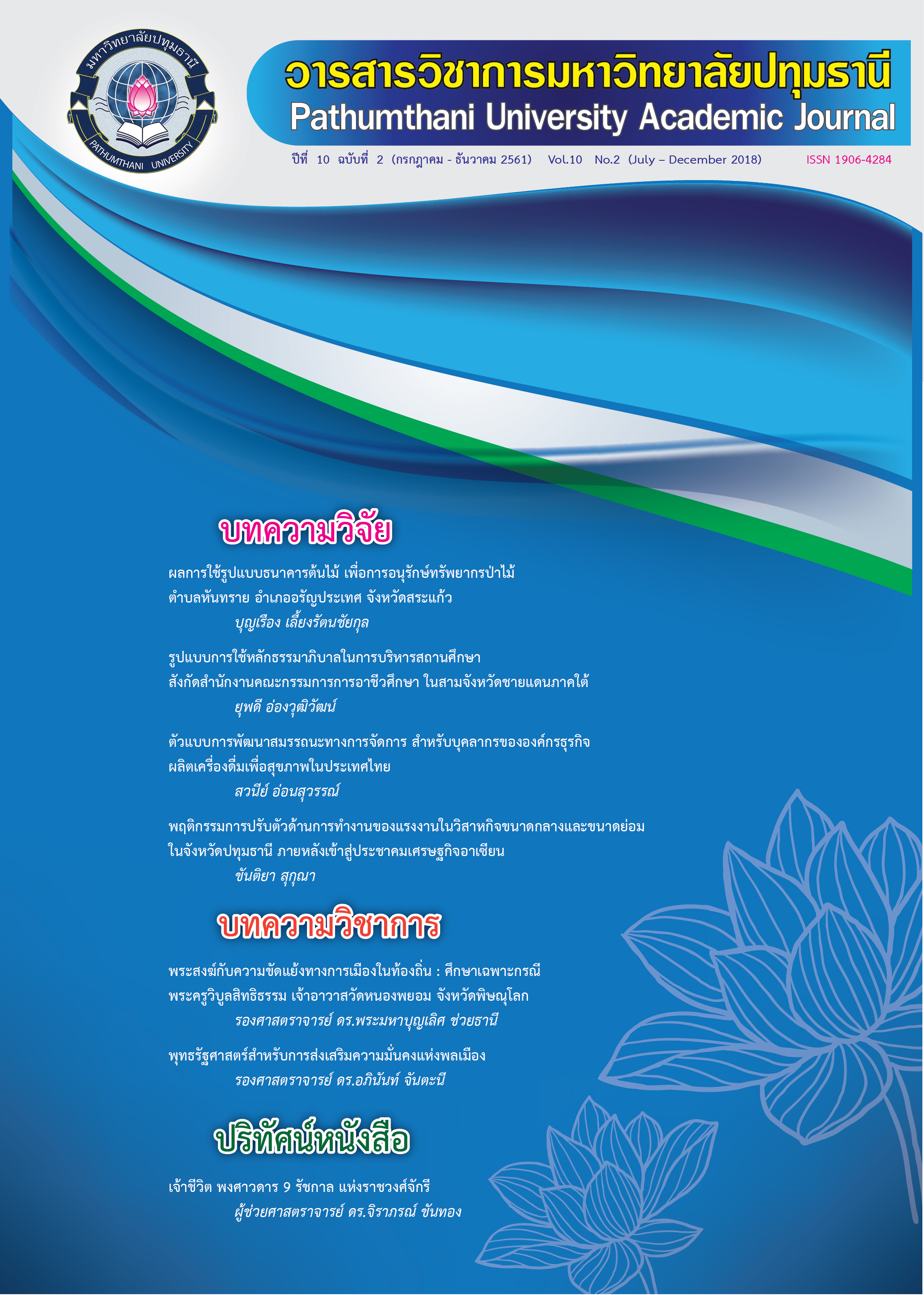รูปแบบภาวะผู้นำกับวุฒิภาวะทางอารมณ์ของผู้บริหารสถานศึกษา
Keywords:
รูปแบบภาวะผู้นำ, วุฒิภาวะทางอารมณ์Abstract
The objectives of this research 1) To study the emotional quotient of school administrators. 2) To study the leadership styles of school administrators. and 3) To study the relationship between leadership style and emotional quotient of school administrators. The research sample group consists of 314 school administrators secondary school in Singburi. The questionnaire consists of rating scale is divided into five levels which are the study of independent variable is the personal information and the leadership styles of school administrators to consist of the telling leadership, selling leadership, participating leadership and delegating leadership and the dependent variable is the emotional quotient of school administrators to consist of the selfawareness, self – regulation, control oneself, empathy and social skill. The research were used in data analysis were percentage, mean, standard deviation and multiple regression analysis. Results 1. The most of the samples were female 60.19 %, the most of ages is 51 years old up 26.43 %, the most of them had the highest level of the bachelor degree or equivalent 68.15 %, the highest monthly income between 30,001 – 40,000 baht 24.20 % and the most basic school board position 45.86 %. 2. The emotional quotient of school administrators, overall are the high level (=4.19, S.D.=0.52), considering the dimensions, it was found that the control oneself is highest and the average is the most (
=4.25 , S.D.=0.53), secondary; the social skill (X=4.24 , S.D.=0.52), the self – regulation (
=4.19 , S.D.=0.51), the self-awareness (
=4.15 , S.D.=0.52) and the empathy (
=4.13 , S.D.=0.51), respectively. 3. The leadership styles of school administrators, overall are the high level (
= 4.12 ,S.D.=0.52), considering the dimensions, it was found that the participating leadership is highest and the average is the most (
=4.22 , S.D.=0.53), secondary; the selling leadership (
=4.12 , S.D.=0.52), the delegating leadership (
=4.10 , S.D.=0.53) and the telling leadership (
=4.03 , S.D.=0.50), respectively. 4. The leadership styles of school administrators found that the participating leadership, the selling leadership, the delegating leadership and the telling leadership positive affect on the emotional quotient of school administrators, the participating leadership positive affect on the emotional quotient of school administrators is the most and the telling leadership positive affect on the emotional quotient of school administrators is the lowest. The relationship of 4 factors to the emotional quotient of school administrators are the high level (R=.895). The 4 factors can predict the emotional quotient of school administrators 80.10%. There are discrepancies in forecasting .221.
References
2. เกรียงศักดิ เจริญวงศ์ศักดิ์. (2554). จอมปราชญ์นักการศึกษา: สังเคราะห์วิเคราะห์และประยุกต์แนวพระราชดำรัส ด้านการศึกษาและการพัฒนาคน. กรุงเทพมหานคร : ด่านสุทธาการพิมพ์.
3. นิตยา วิเศษยา. (2551). ความสัมพันธ์ระหว่างความฉลาดทางอารมณ์กับภาวะผู้นำการเปลี่ยนแปลงของผู้บริหารสถานศึกษา สังกัดสำนักงานเขตพื้นที่การศึกษา จังหวัดสุรินทร์. วิทยานิพนธ์ปริญญาการศึกษามหาบัณฑิต. มหาวิทยาลัยบูรพา.
4. เปรมปรีดิ์ หมู่วิเศษ. (2549). รูปแบบความสัมพันธ์เชิงสาเหตุระหว่างองค์ประกอบความฉลาดทางอารมณ์ของผู้บริหารกับประสิทธิผลโรงเรียนอาชีวศึกษาเอกชน. วิทยานิพนธ์ปริญญาการศึกษามหาบัณฑิต. มหาวิทยาลัยบูรพา.
5. Goleman, Daniel. (1998). What make a leader. Harward Business Review. November-December, 93 - 102.
6. Mayer & Salovey, (1997). " Perceiving Affective Content in Ambiguous Visual Stimuli : Component of Emotional Intelligence". Journal of Personality Assessment.
7. Roderick, A. Baron. (1997). Psychology The Essential Science. Boston: Renslaer Polytechnic Institute.
Downloads
Published
How to Cite
Issue
Section
License
บทความที่ได้รับการตีพิมพ์เป็นลิขสิทธิ์ของวารสารมหาวิทยาลัยปทุมธานี
ข้อความที่ปรากฎในบทความแต่ละเรื่อง เป็นความคิดเห็นส่วนตัวของผู้เขียน กองบรรณาธิการไม่จำเป็นต้องเห็นด้วยเสมอไป และไม่มีส่วนรับผิดชอบใด ๆ ถือเป็นความรับผิดชอบของผู้เขียนแต่เพียงผู้เดียว



